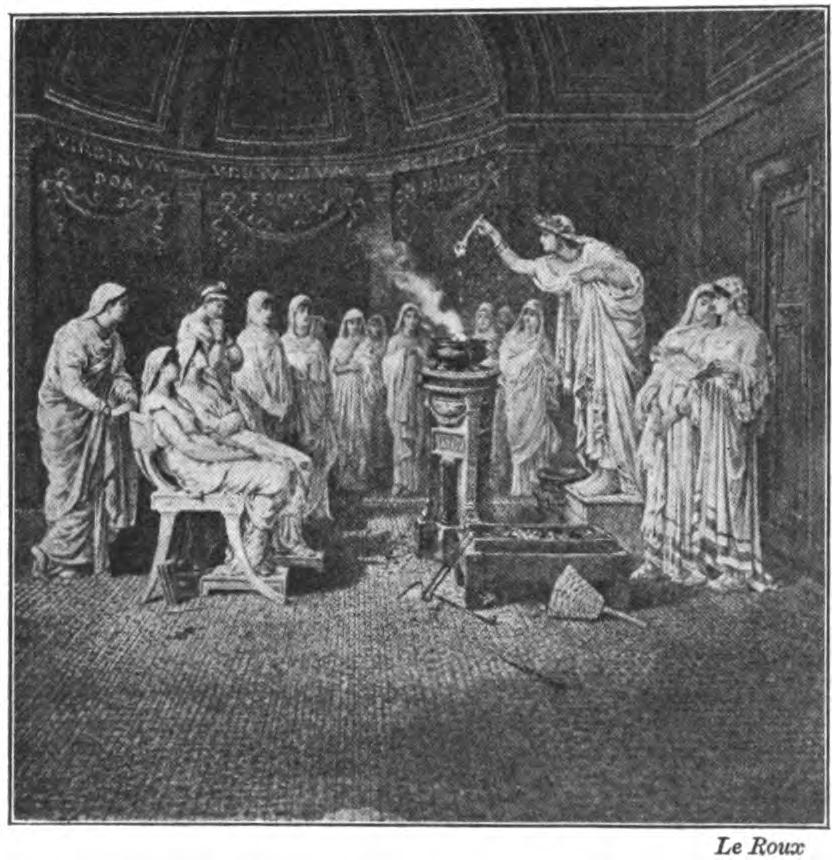
obeyed his father, the father might sell him as a slave or even put him to death . If a man broke the law of the state, his fel low-citizens thought he had forfeited all right to live .


The Romans believed that the spirits of the dead lingered around their tombs. If these spirits re ceived due honor from their de scendants, they were happy and kept loving watch over the home. If they were neg lected, they were miserable and be came mischievous

and dangerous .
The goddess of the hearth was Vesta, and the fire on the hearth was her symbol . Each family paid respect to Vesta at their own fireside; but besides this , a public temple was built in her honor , and there six maidens watched her sacred fires that they might never be permitted to go out . The Romans worshiped Jupiter as father of the gods . The god of war was Mars; the god of property and commerce was Her'cu - les. These four were the principal gods of the early Romans, but there were hosts of others. There was Juno ,
EARLY
THE ROMANS OF THE
REPUBLIC 65
SCHOOL OF VESTAL VIRGINS
Le Roux
66 STORY OF THE ROMAN PEOPLE
wife of Jupiter ; Neptune , god of the waters ; Mi-ner'va the wise ; Ve'nus the beautiful ; the two-faced Janus , whose tem ple was open in war and closed in peace indeed , there was a god for every action . When a Roman was about to carry his corn into the barn , he offered a sacrifice to the god of carrying corn into barns and prayed that he might do it success fully .


a

The worship of the Romans was practiced as a sort of barter be tween themselves and the gods. They believed that if they did not worship the gods , some evil would ( In the Ludovisi Villa , Rome) come upon them ; but that if they offered up prayers and sacrifices, they would get favors . They thought that it was especially pleasing to the gods to watch athletic games ; and therefore if a Roman magistrate wished to make sure of good harvests for the people , or if a military commander was in danger of defeat, he would pro mise the gods that if they would help him , he would celebrate games , or athletic contests , in their honor, such as wrestling and racing . When any important business was to be under taken, the augur, who interpreted the will of the gods , was always consulted . He went to some high place , prayed , and offered up sacrifices, then seated himself with his face to the east to watch the sky. There were many fixed rules for inter preting what he might see or hear . For instance , it was a good
JUNO
sign if a raven croaked on the right; but if a crow appeared , it must croak on the left to bring good luck . Thunder on the left was fortunate for everything but holding the comitia . A flight of birds in one part of the sky was favorable to any proposed plan , but in another part , unfavorable. There were other omens than these appearances in the sky . To spill salt or stumble or sneeze was sure to bring bad luck unless the suppliant made some gift to the gods to ward off their dis pleasure.

In celebrating a marriage, the augur was always called upon to take the auspices, that is , to watch the various omens and see whether they were favorable . This was done before sunrise , for the wedding ceremonies re quired a whole day . The guests came together at the house of the parents of the bride and lis tened eagerly while the augur reported what he had seen , and explained its meaning. Then all eyes were turned upon the bride and bridegroom , for the words of marriage were now to be spoken . The bride wore a snow -white tunic . Her hair had been parted into six locks with the point of a spear , and over it was thrown a red veil . After the words of marriage had been said , some woman friend of the bride's family led the couple to the altar . They walked around it hand in hand


THE ROMANS OF THE EARLY REPUBLIC 67
>
A ROMAN AUGUR








